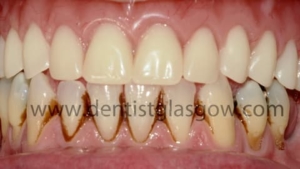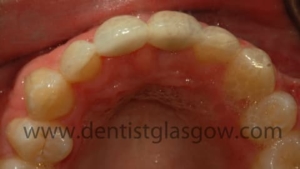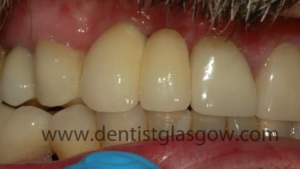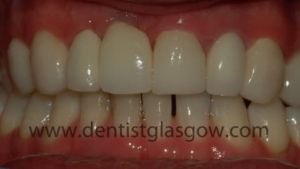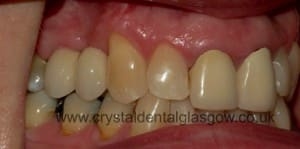Dental Implants Glasgow
Dental implants involve an artificial tooth root which is placed into your jaw to hold a replacement tooth or dental bridge. This makes it a really good long-lasting alternative to dentures and the perfect solution for missing teeth. An implant may not be the same as having your own tooth but it’s the next best thing.

"I recently had a dental implant with Dr Brendan Murphy at Appletree Dental Care. If you are looking for an implant I would highly recommend Brendan and Appletree dental care. I received excellent dental care, which was good value for money. The whole team were very friendly and Brendan explained everything clearly. My dental implant feels and looks great, to the extend that I feel like I have my own tooth back!" Tim Martin, Glasgow patient

"I've just finished my first three implants and because I am so happy with them I'm getting more done now." Innes, Implant Patient

"Brendan stuck with me and for the first time in many years I don't have any pain in the lower part of my mouth." May, Implant patient
Dental Implants – Permanent Solutions for Missing Teeth
There is no need to suffer an embarrassing gap in your teeth when there are so many good dental options available to replace your teeth. Which one depends on how many teeth are missing or need to be removed:
- A single missing tooth will often be replaced with a dental implant and an implant crown such as where we replaced this patient's upper left first premolar or in this case study where an implant crown took care of a decaying upper right premolar.
- Two missing teeth can sometimes be replaced with two implant crowns as here where they are placed on two mini dental implants. Or the answer may be an implant bridge as with these cases of a two tooth bridge on an old single implant and a two tooth bridge spanning an area of bone loss.
- Three missing teeth or more may also call for a three-tooth implant bridge and here is a case where the bridges were separated into a two-part solution - one bridge with three teeth and one with five teeth - to reduce future risks.
- A larger number of missing or to-be-removed teeth could call for a cosmetic implant denture. Often we fit a full arch of teeth on four implants or as here using a fixed titanium bar attached to five implants.
Benefits of Dental Implants
- They help protect your other healthy teeth
- They help keep the natural shape of your face
- They have become a very successful form of dental treatment
- They last a long time and tend to prove very stable
- You worry less about what you eat
- Closest thing to getting your original teeth back
What does Implant Surgery Feel Like?

Innes, a dental implant patient in Glasgow describes his experience at Appletree Dental Care, how he damaged his own front teeth, how he felt about his missing teeth and how he found the experience of getting dental implants fitted.
The Implant Procedure Made Easy
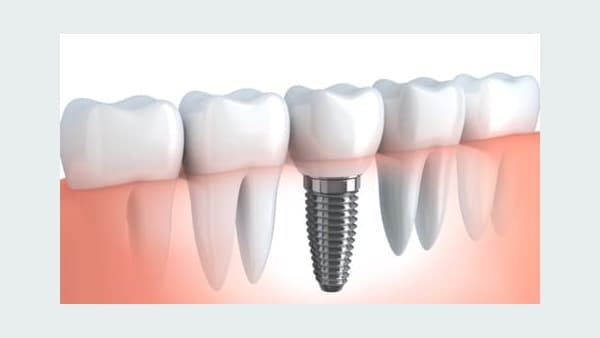
Your implant treatment involves at least two visits to the dental surgery:
- First of all we prepare the correct size of cavity in the bone. This prepares the tooth for the implant.
- The implant itself is like a hollow screw. It is usually made of titanium and is available in different sizes to ensure an accurate fit.
- This then attaches itself to the bone over a few weeks.
- The next part is what goes onto your tooth implant. This could be a porcelain crown or a bridge or even a denture. It depends on your requirements.
- Our dental laboratory partners are closely involved in shading the finished porcelain work to match your existing teeth as closely as possible. This ensures the final result is very cosmetic and long lasting.
How Much Are Dental Implants?
| Dental Implant | £1250 |
| Restored Implant Tooth For example a bridge tooth or crown |
£1250 |
| Implant Dentures With gold locators, not including implant costs |
£2000 to £4000 |
| Implant Dentures With milled titanium bars, not including implant costs |
£5000 |
| Fixed Implant Full arch acrylic, not including implant costs |
£6000 |
| Fixed Implant Whole arch zirconium, not including implant costs |
£9500 |
Telephone 0141 339 1961 for an appointment or complete the form on our contact page.
Why Are Implants So Expensive?
There is often confusion amongst patients regarding the potential costs of dental implant treatments. Glasgow dental patients tend to be prudent shoppers and as such we have tried to make all fees for implants and restored teeth inclusive where possible vis a vis implants and restored teeth. This is reflected in Appletree Dental Care price lists and displayed clearly on our website.
Essentially, the key issues to remember are:
The tooth implant is placed first.Several weeks later your implant(s) will be restored. Porcelain work is then billed per tooth depending on the type of porcelain. These fees include all laboratory costs (including shade matching), component costs (for example gold or zirconium abutments) and there are no hidden fees.
It is possible to fix dentures or removable appliances to implants and this offers considerably greater resistance to movement when eating more challenging foods such as steak or biting into apples. We can also avoid the bulk of normal dentures, particularly on the palate where the gag reflex often makes plastic dentures intolerable to many patients.
Removable appliances vary in cost depending on whether they involve gold abutments or a titanium bar to lock the denture in situ. They are fabricated with the very best technical expertise to offer highly cosmetic, anatomically formed acrylics and individually placed teeth.
Cosmetic dentistry involves much more than simply replacing enamel with composite or porcelain. The facial profile, lip support and gum positions must be considered after tooth loss. This is particularly so when teeth were removed many years ago or the event was preceded by advanced gum disease and associated bone loss.
A popular dental restoration these days is the appliance fixed on four implants, often referred to as All On Four. When fabricated in acrylic this will be priced per jaw and provide 12-14 teeth. If porcelain bridgework on four implants is the chosen final restoration then 'All On Four' is still feasible but limited to ten teeth.
We are alway quick to remind patients that the consultation is free and that this will be a 20 minute appointment with one of our implant dentists in Glasgow.
Cutting the Cost of Implants
Jeanette had been wearing a plastic denture and was referred by her dentist in Oban for implants at another dental practice in Glasgow. Unhappy with the quote she received there, she had searched online for dental implant prices and discovered our price list. She liked what she saw and made an appointment.
First Dr Murphy placed two implants with healing caps.
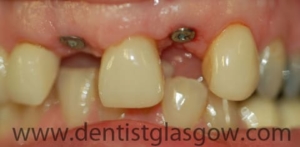
Ten weeks later impressions were taken to fabricate gold abutments through which titanium screws are attached.
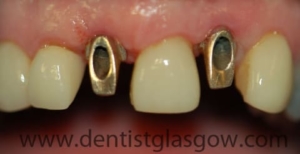
Three months after treatment started, once Jeanette's implants were fully integrated, two pressed porcelain ceramic crowns were cemented onto the gold abutments.

Her two implants with gold abutments and ceramic crowns cost Jeanette £3700.
Jeanette's verdict: "I'm happy that I did my own research. My husband had some cosmetic work done by Dr Murphy a few years ago but the reviews on implants were also very good for Appletree. It was worth the trips down to Glasgow every few weeks and I'll be visiting now every year for routine checks."
What are Mini Implants?
Mini dental implants are just smaller versions of regular implants that are placed into the jawbone. And the good news is clinical studies show they often work just as well as larger implants.
What counts as a mini implant? Generally implants with a diameter of 3.5mm or less are considered mini. Most commonly used implants range in diameter from 3.0mm to 6.0mm. As for length, short implants are usually any that are under 9mm in length.
After placing a mini implant, we usually recommend a healing period of about two to four months. This gives the implant time to bond properly with the bone before attaching a crown, bridge, or denture.
What makes mini implants so effective is how well they integrate with the bone—almost like they become part of it. That’s different from natural teeth, which are connected to the bone by a thin ligament. That ligament can allow bacteria to creep in, which is how gum disease and deep pockets around teeth often start. Because implants don’t have this ligament, and if your mouth is kept clean post-implant, you’re less likely to run into those problems.
What is the Process for Getting an Implant?

The exact timetable might vary by patient but generally it looks like this:
- Initial consultation, usually free of charge, to discuss implant treatment
- X-rays, scan, dental impressions as required to scope the treatment
- Extraction of the infected or broken tooth if necessary. Or preparation where there is a missing tooth.
- Placing of the dental implant once the infected area is healed
- Fitting of the restoration, which may be a crown or bridge or even denture.
- Follow up appointment and often a visit to the dental hygienist
Dental Implant Case Studies
Fixed Titanium Bar on Dental Implants: When There is Insufficient Bone
Donald wanted dental implants but did not have sufficient bone. We used sinus grafts, implants, a titanium bar and high impact acrylic for a very cosmetic solution.
Front Teeth Knocked Out: Successfully Replaced by Dental Implant and Cantilever Bridge
Mark was assaulted and lost his two front teeth. We replaced them with a dental implant and two teeth on a dental bridge.
Replacing Old Dental Bridge with an Implant: Case Study
Bruce came to our Glasgow dental practice with bone damaged by a root fracture. This added to the challenge of placing his dental implant.
Old Removable Denture Replaced with Mini Dental Implants
This dental patient travelled to Glasgow to replace his old denture with dental implants resulting in a much-improved smile.
Replace an Upper Molar with Dental Implant
After a recent root canal failure, Adrian wanted a dental implant and asked his dentist to refer hime to Appletree.
Replacing an Old NHS Crown with an Implant and Porcelain Bridge
Janice had problems with an old NHS crown which we replaced with an implant crown instead of a removable denture.
Does It Hurt To Get an Implant?
Most patients would say no. Implants are placed with a lot of irrigation using saline which helps to keep them nice and cool.
The treatment is done in a very controlled environment. and you’re also 100% numb when we’re placing implants.
There may be swelling afterwards, possibly some bruising and discomfort for two or three days but that will usually settle
We will usually supply you with some anti-inflammatories and perhaps some antibiotics to reduce any post operative infection, swelling or pain.
Carry on as normal
After you’ve had an implant, you can more or less carry on as if the implant is one of your own teeth.
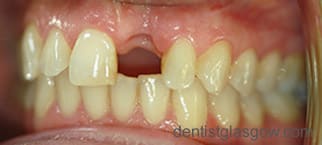
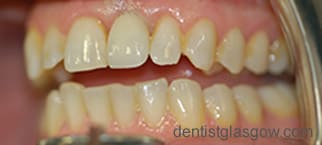
There are some good photographs of implant work before and after dental surgery for you to view in our cosmetic implant gallery.
Many of these pictures of dental implants illustrate the challenges and rewards of modern tooth replacement.
If you have any questions about these cases or would like to know more about the different types of implants please contact our Glasgow practice today.
Replacing a Decaying Tooth
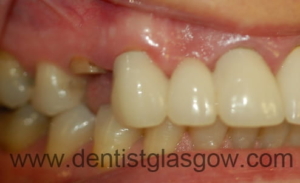
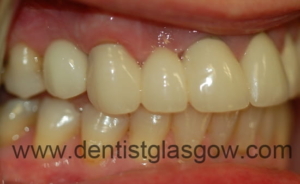
This patient attended our Glasgow practice with a decaying upper right premolar which, unfortunately, was not restorable.
We removed the root and then placed a Biohorizons titanium implant.
After a period of three months to allow adequate integration of the implant with the bone and the settling of gum tissues, we added a gold post and porcelain crown for a very cosmetic result.
All on 4 Implants
A classic and very well-established dental restoration is to fix several teeth onto four implants, often referred to as All-on-4. This is also a way we can give you new teeth in a day.
- Full arch restoration: All-on-4 implants provide a complete solution for patients if you are missing all of your teeth in either the upper or lower jaw, or even both. We use just four strategically-placed dental implants to support a full arch of prosthetic teeth. The result is a fixed, permanent solution that looks and feels and functions like your natural teeth.
- Faster treatment and recovery: Traditional dental implant methods often mean you need multiple surgeries over several months. By contrast, All-on-4 typically involves just one surgical procedure to place all of your implants. Happily this significantly reduces your overall treatment time and allows for a quicker recovery. There’s a good chance you can resume normal activities within a few days to a week after the procedure.
- Immediate function: One of the most appealing aspects of All-on-4 is the "teeth in a day" idea. Patients usually receive a temporary set of fixed teeth on the same day as their implant surgery. This means they leave the dental practice with a functional, good-looking smile even as their implants heal. We then fit the final permanent prosthesis a few months later.
- Bone preservation: Our All-on-4 technique cleverly utilises available bone by tilting the two posterior implants at an angle (usually 30 to 45 degrees). This allows longer implants to be used and increases bone-to-implant contact. At the same time, it also often eliminates the need for bone grafting, which you might otherwise require before getting implants.
- Cost-effective: While still a significant financial investment, All-on-4 can be more economical than other full-arch methods. The reduced number of implants, avoidance of bone grafts in many cases and fewer surgical procedures all contribute to lower overall costs. Additionally, the potential for the implants to last a lifetime makes them a cost-effective long-term solution. Remember to ask about our dental finance plans.
- Improved quality of life: All-on-4 implants can dramatically improve your quality of life. They restore your ability to eat a wide variety of foods, often including those that were previously a problem with dentures or missing teeth. Your speech clarity can improve as well. But perhaps most importantly, many patients report increased self-esteem and confidence with their new natural-looking smile.
- Long-lasting results: With proper care and regular dental check-ups here at the surgery, All-on-4 implants can last for decades, potentially even a lifetime. The implants integrate with the jawbone, providing a stable foundation for the prosthetic teeth. While the prosthesis itself may need replacement after 10-15 years due to normal wear, the implants themselves can last much longer.
- Easier maintenance: Unlike removable dentures, which require tiresome nightly removal and cleaning, you care for All-on-4 implants much like natural teeth. Regular brushing, flossing (we’ll tell you about special tools designed for implants), and dental check-ups are typically all that's needed to maintain them. This fixed nature makes your daily oral hygiene simpler and more convenient.
- Prevents further bone loss: When you lose teeth, your jawbone begins to resorb or shrink due to lack of stimulation. Dental implants, including All-on-4, mimic your natural tooth roots and provide stimulation to the jawbone. This helps us maintain bone density and facial structure, preventing the sunken appearance often associated with long-term denture use.
- Suitable for many patients: Our value-for-money All-on-4 technique has made implant treatment accessible to a wider range of patients. Even those who have been previously told they lack sufficient bone for traditional implants may be candidates for All-on-4. The technique's ability to make use of available bone means that patients who would otherwise need extensive bone grafting can avoid this additional procedure.
All on 4 Implants - A View From the Lab
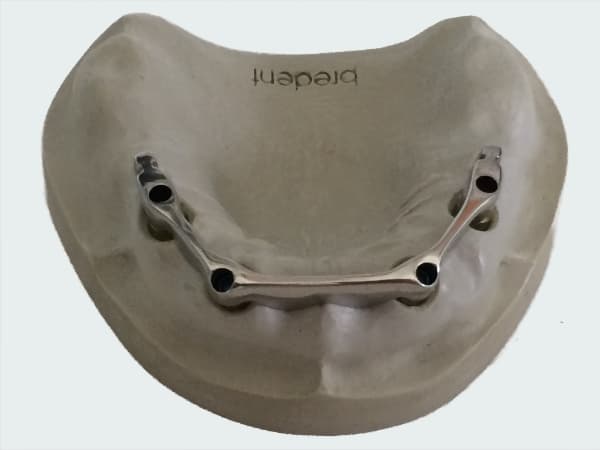
Here we see a fixed titanium bar anchored in place by the four dental implants. Even when there are limited cosmetic implant options at the back of the mouth due to lack of bone or poor quality bone, a titanium implant bar can be extended posteriorly from the implants towards the front of the upper and lower jaw.
This affords excellent retention, uniform splinting of individual implants which reduces latent failures and solid resistance to chewing forces, even when the patient tucks into a well done steak!
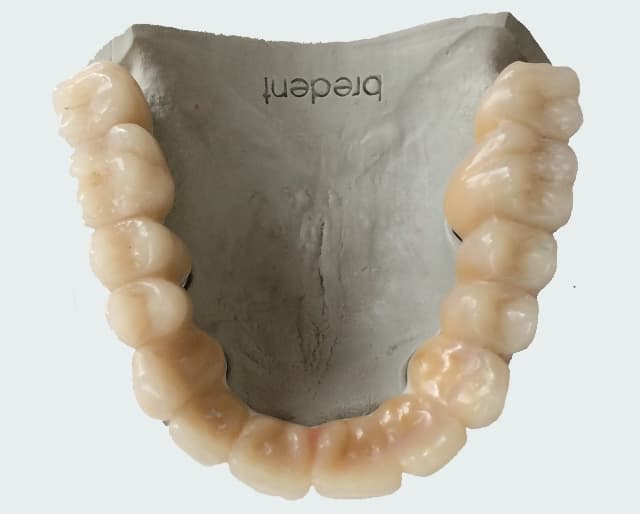
And here you can see the composite restoration fixed to the implants. The composite design is very cosmetic and can be easily repaired if the patient suffers a fracture in years to come.
Our technicians are able to recreate the gum and tooth anatomy long after remaining teeth have been removed. This establishes the correct cosmetic proportions, allows for gum and bone shrinkage and provides excellent lip support.
Implant Patient Reviews
"The whole process of an implant was well explained as were the time frames.The time and effort he put into the process was incredible." Matt - 5 star review on Google
"Review of implant for front upper tooth After number of years my front upper tooth root had resorbed which left it unstable and loose. This was pretty traumatic for myself. After researching a number of options and going for a number consultations, Brendan and his team really stood out making me feel at ease. The process was excellent and result is I have an implant that feels and looks better than I could hope for. I can't recommend the guys highly enough. If you are looking for an implant go see them straight away! Finance option was very easy process. I would give 6 out of 5!" Tom Mitchell - 5 star review on Google
"I recently had an implant at this practice after a recommendation from a friend. Brendan was charming and I felt extremely confident that he was going to do a great job from the first consultation and that was indeed the case. I'm absolutely delighted with my new implant and the treatment and service I received at this practice. Of the rest of the staff, the dental nurses are great and the receptionists are really helpful and go out of their way to accommodate appointments." Marnie Black
"I’m half way through the implants process. The staff at Appletree build a trusting relationship with the patient so that helped reduce anxiety. The biggest procedure was no worse than going to the hairdresser. The aftercare advice and follow up is superb." Carol Hainey
"I had an implant fitted by Brendan after an implant fitted abroad had failed. Brendan was meticulous in ensuring that everything was done to make the new implant take after the damage caused with the previous attempt. I can’t thank him enough for his work and the attitude of all the staff I dealt with along the way. Fantastic." David Holmes
"After losing my front tooth to an abscess and being fitted with a dental plate, I was at my wit's end trying to tolerate the denture. I hated it! After some internet research I made an initial free consultation appointment with Dr Brendan Murphy to inquire about an implant. After his clear and concise explanation I decided to go ahead with the implant and I can say that i'm really glad I did. Six months after starting treatment I had my final appointment today to check the tooth that was fitted two weeks ago and was discharged until a years time for a follow up. I am delighted with the result. Brendan and his staff were welcoming, professional and highly skilled in what they do. They put me at ease and made sure I was fully informed of all stages of the procedures being carried out at the time. Would highly recommend them to anyone thinking about implants. Thank you for restoring my smile." Lesley Kavanagh - Glasgow
"Went to various different dentist for consolations on implants and Brendan gave me the best advice. The procedure was well explained before hand and was painless throughout. Brendan and his team made me feel very welcome and I would highly recommend him." George McFadyen
"I chipped my tooth and Appletree dental was recommended to me by my dentist as he believed they would be able to do a grand job based on what I was looking for.. at first I was a bit unsure due to the fact that every dentist terrifies me however.. This is by far a dental Practice I’ll be coming back to over and over again if I need any treatment. The staff was first class and very well mannered and polite.. The girls at reception took time out their day to Make sure I was comfortable anytime I came in. Brendon who was my dentist took an interest in my person life and we spoke as if we have been Friends for years. I had to get the chipped tooth removed and replace with an implant which he completed and managed the whole process from start to finish amazingly. It was a long process however he made sure each stage was done to perfection, he made sure I was booked in at the appropriate times and communication was spot on. Even when I was late to an appointment he waited and ensured I was able to complete the treatment.. Surprisingly my fear of the dentist is gone and I’m truly at ease when I think about going to the dentist. Nothing but praises for this dental care!" Smart Osadolor - Glasgow dental patient
Appletree Dental Care is where I refer patients for implants, cosmetic dentistry and full mouth rehabilitation. Every one has been delighted with their new smile." Louise Richardson Glasgow Dentist
Dental Implants FAQs
How should I look after my dental implants once they’re fitted?
The long-term success of implants depends on good home care and regular dental visits. Daily cleaning, interdental care, and attending routine reviews are essential for keeping implants healthy.
Can dental implants get gum infections?
Yes. Just like natural teeth, poorly maintained implants can develop plaque and tartar deposits, leading to gum infection, bleeding and discomfort. With good hygiene and regular check-ups, the risk is greatly reduced.
How long do dental implants last?
With proper care and maintenance, implants can last for many years. While there is no lifetime guarantee, success rates are typically above 95% after five years, and many implants function well for decades.
What is the best way to clean around dental implants?
Brush normally and also clean between your teeth and implants daily with floss or interdental brushes. Professional cleaning, X-rays and regular hygiene visits are recommended to protect gum and bone health.
How does smoking affect dental implants?
Smoking increases the risk of gum disease and long-term implant failure. Nicotine, whether from cigarettes or replacement products, damages gums and bone. The best advice is to stop smoking before and after implant treatment.
What should I do after implant surgery?
Most patients only experience mild discomfort. Aftercare advice includes resting for 24 hours, using an extra pillow, applying ice packs, avoiding alcohol and hot drinks, eating soft foods, and following brushing and rinsing guidance.
Do dental implants ever fail?
Implant success rates are very high — around 97% in our Glasgow practice. Failures are rare and usually occur in the first year. If an implant fails during this time, we replace it free of charge.
Can a failed implant be replaced?
Yes. A failed implant can usually be replaced after a healing period of a few months. It is very unusual for two consecutive implants to fail.
What are the risks of implant treatment?
Risks include swelling and bruising (about 20%), a small risk of damage to neighbouring teeth (around 1%), and very rare nerve irritation in the lower jaw. Modern scanning reduces these risks, and serious complications are uncommon.
The Perils of Peri-Implantitis

Due to the rare occurrence of pain with this condition, in much the same way that gum disease around our existing teeth affects us, patients often ignore or are oblivious to the signs.
Imaging around implants can also be misleading: X-rays are two dimensional pictures and metal superimposes on bone and dental implants don't show up well on scans, giving off a considerable amount of what might be called glare.
Visual checks and hygiene are the key to avoidance of peri-implantitis. Most of the time the condition is treatable and patients mustn't panic!
Surgical Procedures Involved in Dental Implant Treatment
Sinus bone augmentation
Shortage of bone in the upper jaw can occur as a result of bone loss in the sinus area, both internally and also due to the bone loss around the tooth roots following tooth loss.
This shortage of bone height below the maxillary sinus may not allow the placement of implants of suitable length. We sometimes therefore need to carry out sinus bone augmentation in order to facilitate the placement of implants of a suitable size.
Sinus augmentations are a routine procedure and common adjunct to implant therapy in this part of the mouth and are very predictable and carry a very high success rate in my experience.
In fact, research shows that implants placed into sinus grafts have a higher success rate than those in regular maxillary bone. Once again, we are talking of success rates in excess of 95%.
This procedure involves raising the sinus lining and placing a bone material into the space we create. This is usually left for several months during which time the graft usually consolidates and becomes suitable bone in which to place implants of a sufficient length.
If there is 4-8mm of bone at the start of treatment we will often place implants and augment the sinus simultaneously. Sinus augmentations are generally carried out with local anaesthetic as with normal dental treatment.
Local and Block Grafting
Local grafting involves the use of materials to cover up small defects where bone has been damaged by infection, root fractures and minor trauma before the tooth was extracted. It can also cover exposed threads on implants when the ridge of bone is thin near its surface.
Bone may be carefully removed from other areas of the mouth to supplement deficient bone where implants are required. This is called block grafting.
Graft Materials: the material we often use is called BioOss, a de-proteinated bone mineral. You can be assured that it is an absolutely safe material (no organic components remain after laboratory preparation) and it has been subject to a huge amount of research all over the world, with an absence of negative feedback. This is unusual in the dental/medical field.
BioOss has been proven to be the best material in sinus grafts and the most recently published figures confirm that success rates are as good as for implants placed without sinus involvement. A membrane is often used to protect local or sinus grafts.
Once integrated and functioning, the overall research shows that you have in excess of a 90% chance of any implant still performing fine after 25 years. Therefore implants are a long term and predictable treatment option, probably a lifetime.
Free consultation
If you are interested in hearing more about dental implant surgery please contact us today to talk it through with one of our dentists.
Links
For more information on implants take a look at the Association of Dental Implantology website.
The British Dental Health Association also has advice on dental implants.

